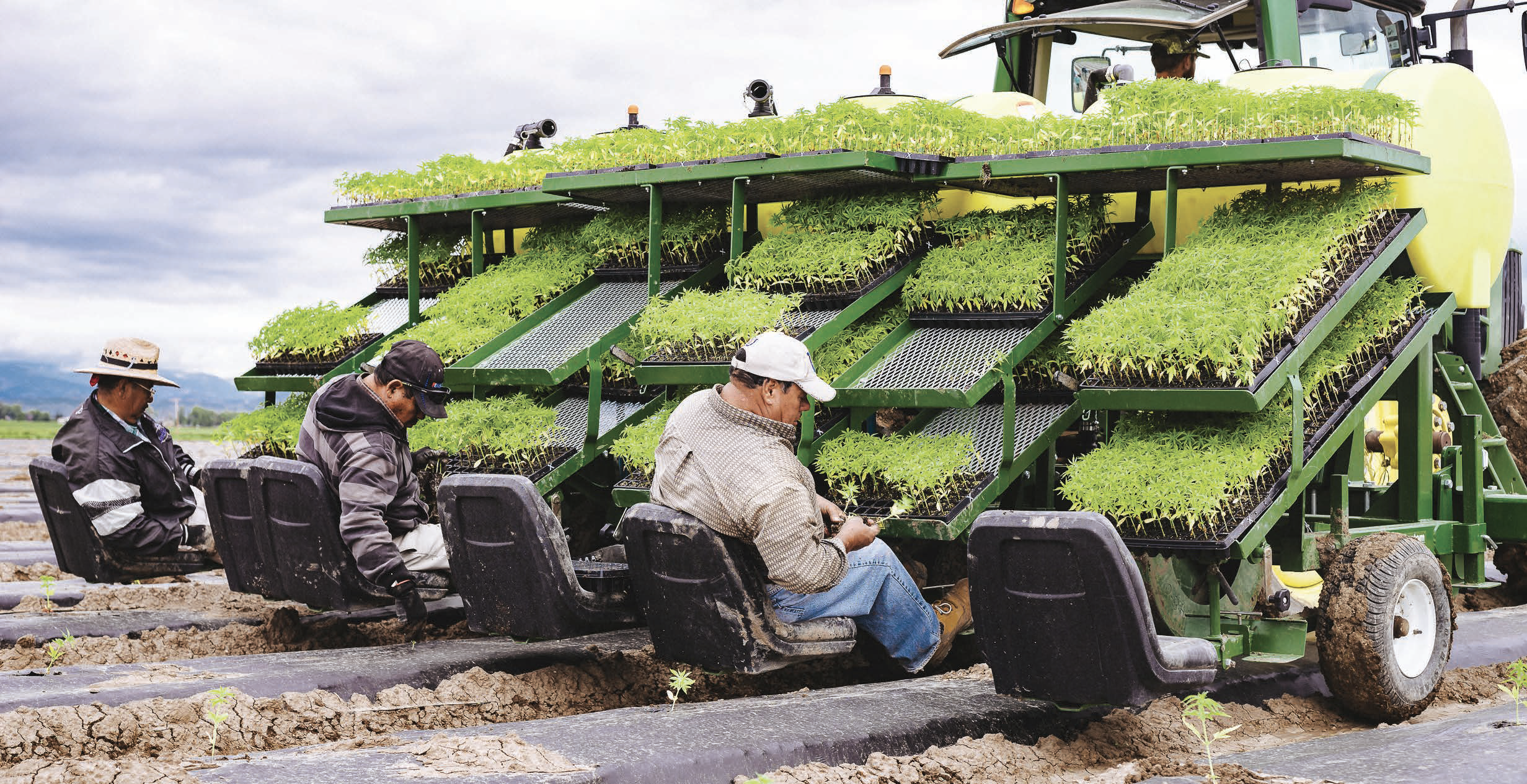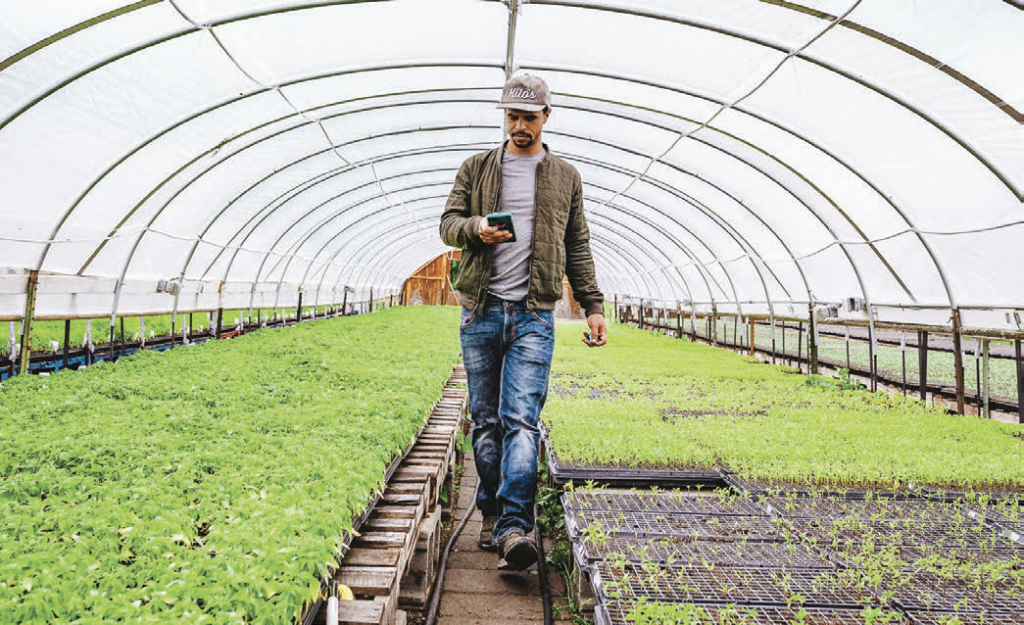
Feb 10, 2021
Blue Forest Farms creates a community around the surging industry of organic hemp production
What began as a small start-up has turned into a 150-acre hemp producer on a mission to spread the word about the benefits of hemp. Blue Forest Farms is an organic hemp farm in Longmont, Colorado, with a retail line and original seed and genetics program. The farm also provides extraction and processing services, as well as white label services.
“In 2016/2017, hemp was really new still but the therapeutic benefits of cannabis and of CBD was actually pretty well understood in the Colorado community and that was just because of legal cannabis,” said Chief Growth Officer Zach Dorsett. “It’s one of the reasons why it seemed like a really clear choice to move into.”
Blue Forest Farms went all in and planted 22 acres, which Dorsett said was “a lot for a first year and for that time period.”
The farm used seeds from other companies for the first two years of production. After Dorsett joined the company in 2018, the team began to look at creating their own genetics.
“As far as genetics, we kind of realized they weren’t everything we wanted them to be the first couple years we grew so we’ve invested a lot of science into our program,” said co-founder and CEO Trina Johnson.
The farm currently has six field-tested, commercial varieties available for seed, which are also used for the farms CBD retail line, BFF Hemp, launched in 2020. Six new commercial varieties that were tested in the last year will be released in 2021.
The farm makes the most of the knowledge and experience the leadership team brings, leveraging Dorsett’s experience in the cannabis industry, Johnson’s business-savvy, and co-founder Dave Asbury’s expertise in organic production. Asbury owns Full Circle Farms, a USDA Certified Organic farm in Longmont, Colorado, offering more than 100 varieties of vegetables.
Growing Hemp

“What you had was this sort of convergence of commercial agriculture with Dave and then all of the expertise of the hemp plant really coming from cannabis,” Dorsett said. “Because cannabis [production] is kind of very small, that would be in a small indoor warehouse or might be growing in a couple of greenhouses. This 22 acres of space was over 40,000 plants. And so just being able to translate that knowledge from really small scale growing to commercial farming was a real challenge.”
The team also found hemp production to be more labor-intensive, initially requiring a team of about 80 people to sometimes work long days.
“Everything was [done] by hand. Seeds were planted by hand, plants were sprouted and cared for by hand and watered by hand, then transplanted into the ground by hand,” Dorsett said.
The philosophy at Blue Forest Farms is centered on respect for the plant, the soil it grows in, and the partnership between all organisms involved.
“That’s the thing about organic farming … it’s very labor intensive but it’s like in a micro scale. You rely on these microorganisms in organic farming to do a lot of the heavy lifting,” Dorsett said. “It’s just a team effort. Not just between the human hands, but between the plant and the millions and billions and trillions of organisms.”
During his time at Blue Forest Farms, Dorsett has visited other hemp farms and has pinpointed two common mistakes among growers: hemp plants being grown on land with poor soil quality, or planted too close to other crops – particularly conventional crops. While hemp plants are resilient, the limited products that can be used on the crop when it comes to controlling pests and diseases make it especially important to set up your crop for success.
“It really isn’t well understood how any of these agricultural products that we have used for other crops, how it impacts hemp and post harvest processing of hemp, and the products that we make out of hemp. Because we don’t know, and these are consumable products, you can’t really put anything on hemp,” Dorsett said. “Even if you’re not growing organically, you can’t put anything on your hemp, and if you’ve got this GMO crazy mutant crop over here … the pests that come out of those crops and come and attack the hemp fields, it’s a problem.”
So far the farm has had minimal pest problems, which Dorsett attributes to the team’s focus on preventative care and Colorado’s dry climate.
Some aphids and mites were found early on in the season but he said “it didn’t really become problematic outside the greenhouse. Using the compost tea as a foliar as well as a soil application was extremely beneficial for us in that kind of vegetative plant state, where the plants are just developing leaves in the early part of their life.”
Other pests commonly seen in Colorado hemp farms are grasshoppers, russet mites and corn earworm.
Building a community
Part of Blue Forest Farms seed program is educating growers on how to produce healthy, consistent hemp plants and educating communities on the benefits of hemp-derived products.
“That’s the program that we’ve really been most successful at — helping other farmers,” Dorsett said. “We’ve really invested on crafting quality and compliant genetics that are suitable for hemp farming within the United States and helping farmers be successful in that endeavor just by sharing some of our knowledge and experience. I think that’s been the most enjoyable thing too – being able to introduce people to the plant and to help them understand how it works in addition to CBD, which really dominates the hemp market right now. This is a plant that has so much to offer us in so many industries.”
Educational resources like guides, checklists and recommendations are available on the Blue Forest Farms website, blueforestfarms.com, covering topics from planting and pest mitigation to compliance, drying and storage.
While some farmers have had success in the industry, results haven’t always met expectations during the past year.
“We’ve been able to see some really good success and see people grow their program, and really help their families and their communities,” Dorsett said. “As the market evolved in the last year, and especially with coronavirus, the stories that I’ve heard from farmers have been a lot different, and it’s a lot of disappointment.”
A saturated market, changes in legislation, and limited access to banking and supply chain resources have added to the industry’s challenges.
“Right now, Google and a lot of the tech resources, block search queries for certain terms like CBD, because of the lack of clarity, I guess you could say, over hemp,” Dorsett said. “And that makes it challenging. It makes it challenging for customers to find sellers, and for sellers to find customers. But what we’ve found is that the rewards are worth it in the end.”
This is where organic farming practices can aid in finding a market for hemp products, Dorsett said.
“Connecting the story of the plant material that is coming off this farm to the products that people are putting in their body — we see that consumers really want that connection,” he said. “They want to know where their hemp is coming from, they want to know how it’s grown.”
Dorsett and Johnson are hopeful that as the hemp industry expands, growers will have access to additional resources, such as subsidies, just as growers in other industries do. For now, the Blue Forest Farms team is working on sharing the benefits of hemp with other growers and their communities.
“Cannabis is for a few; but hemp is for everybody,” Johnson said. “It’s medicine, and it’s changing lives — and that’s the new messaging instead of, you know, a lot of the propaganda around it. Hemp is green and it’s sustainable. It is going to create sustainability for every industry and our entire infrastructure.”









